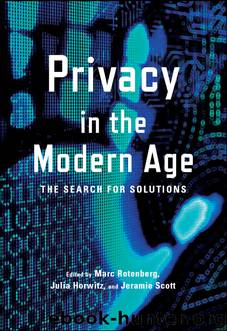Privacy in the Modern Age by Marc Rotenberg

Author:Marc Rotenberg [Rotenberg, Marc; Horwitz, Julia; Scott, Jeramie]
Language: eng
Format: epub
ISBN: 9781620971086
Publisher: The New Press
* * *
The dominant surveillance discourse is not necessarily appreciably richer in fallacies than is the case for the claims of critics. However, it is dominant, and individuals clearly have socially patterned differential access to the ability to create and propagate surveillance and privacy worldviews. As such, it warrants greater attention.
Of course the views of all claimants must be examined, not only the advocates of technology. By adding “never” or otherwise reversing many of the techno-fallacies, we may see mirror-image fallacies held by some critics (e.g., the fallacy that technical solutions are never to be preferred). Other fallacies unique to critics may be noted. Thus some critics fail to appreciate the advantages of technology, the virtues of community, and the dangers of anarchy. A list of techno-fallacies for privacy advocates would include: the fallacy that with new technologies the sky is falling or the apocalypse approaching; that if you can imagine bad things happening, they surely will; that the people always know what’s best (the populist fallacy); that privacy is an unlimited good (or if some privacy is good, more must be better); that privacy is primal (i.e., that it ought to take precedence over other values); that privacy is only an individual value rather than a social one; that privacy can only be taken from persons, rather than imposed upon them; that because something worked (or failed) in the past, it will in the future; that technology is always the problem and never the solution (the Luddite fallacy); and related to this, that technology can only be used to cross informational borders rather than to protect them.
In order to further constructive dialogue besides understanding any claimant’s assumptions and possible fallacies, we need to know what rules the claimant plays by and what the game is. The worldview of those who start with advocacy rather than analysis is by definition self-serving. The rhetorical devices expected there differ from those of the academic analyst, who must start with questions, not answers, and question all claimants. The scholar of course serves his or her interests in the pursuit of truth. But especially because scholars are making truth claims, they must also strive for consistency and a strong tilt toward logic and evidence. In that regard several failings of academics can be noted: the overly broad academic generalization; the dressing of common sense (or nonsense) in multisyllabic jargon replete with esoteric references; the use of Ockham’s razor to nitpickingly slice the world into too many categories; unduly timid waffling in the face of complexity and always-imperfect data; the failure to clearly enough differentiate value statements from scientific statements; and the reverse—failing to specify how the empirical within the value might be assessed. More a cheap shot than a fallacy is risk-free Monday-morning quarterbacking.
There is a path, however twisting, changing, and filled with brambles and illusions, between Tennyson’s early-nineteenth-century optimism—“For I dipped into the future, far as the eye could see, saw the world, and all the wonders that would be”—and Einstein’s twentieth-century worry that technological developments can become like an ax in the hands of a killer.
Download
This site does not store any files on its server. We only index and link to content provided by other sites. Please contact the content providers to delete copyright contents if any and email us, we'll remove relevant links or contents immediately.
Cecilia; Or, Memoirs of an Heiress — Volume 1 by Fanny Burney(31322)
Cecilia; Or, Memoirs of an Heiress — Volume 3 by Fanny Burney(30928)
Cecilia; Or, Memoirs of an Heiress — Volume 2 by Fanny Burney(30885)
The Great Music City by Andrea Baker(21195)
We're Going to Need More Wine by Gabrielle Union(18064)
Bombshells: Glamour Girls of a Lifetime by Sullivan Steve(13100)
Pimp by Iceberg Slim(12922)
All the Missing Girls by Megan Miranda(12739)
Fifty Shades Freed by E L James(12443)
Norse Mythology by Gaiman Neil(11873)
Talking to Strangers by Malcolm Gladwell(11861)
Crazy Rich Asians by Kevin Kwan(8340)
Mindhunter: Inside the FBI's Elite Serial Crime Unit by John E. Douglas & Mark Olshaker(7827)
The Lost Art of Listening by Michael P. Nichols(6462)
Enlightenment Now: The Case for Reason, Science, Humanism, and Progress by Steven Pinker(6402)
Bad Blood by John Carreyrou(5761)
The Four Agreements by Don Miguel Ruiz(5502)
Weapons of Math Destruction by Cathy O'Neil(5029)
We Need to Talk by Celeste Headlee(4861)
